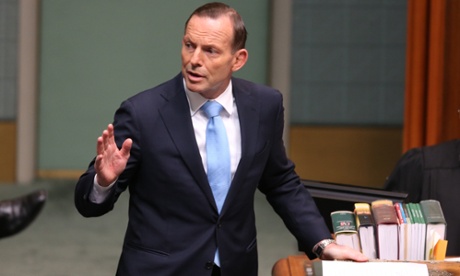Australian health workers have not been sent to west Africa pending an ‘iron-clad’ agreement on evacuating them if infected

Australia’s allies have asked for more help in the fight against the Ebola outbreak, Tony Abbott has said. The prime minister said requests from the US, UK and Sierra Leone would be “carefully” considered.
The prime minister told MPs he discussed the response to the Ebola outbreak with Barack Obama during a telephone call on Wednesday and that Australia had been asked to help more.
“Yes, partners and allies would like us to do more,” Abbott told parliament.
Labor and the Greens have slammed the government for its reluctance to send Australian medical teams to west Africa to contain the disease, with Labor saying the Coalition’s response is “not good enough”.
Brett Exell, from the Department of Foreign Affairs and Trade (Dfat), earlier told a Senate estimates hearing: “Requests have come in for both financial support and other assistance like personnel and protective equipment.”
At the same hearing, the head of Dfat, Peter Varghese, said the department was making progress in securing an evacuation route for health workers who may become infected with Ebola in west Africa.
The government has been reluctant to send Australians to west Africa until an “iron-clad” agreement on evacuating health workers had been reached.
A recently established super-committee encompassing senior members of several public service departments is looking at issues relating to the deployment of Australian health workers.
The interdepartmental committee (IDC) is made up by officials from health, Dfat, defence, immigration, agriculture, the treasury, the prime minister’s department and cabinet and Emergency Management Australia.
“This is a priority for the government, and therefore a priority for [Dfat]. [This] is a significant outbreak and Australia wishes to do its part in helping to deal with it,” Varghese said.
“I think we’ve been able to devote the resources we need to devote to it up to this point and if there is a requirement to put even more resources into it, I expect we will be able to do it.”
The federal government has allocated $18m in funding to help the international efforts to stop the spread of the disease. Of that, $3.5m has gone to the World Health Organisation (WHO) and $2.5m to non-government organisations. The organisations that have already received money are World Vision, Save the Children, Caritas and Plan International.
A further $2m was requested and given to the British government to support the delivery of “frontline services in Sierra Leone, through the UK government”, said Ewen McDonald from Dfat.
Australia is also one of only two countries to have given money to the UN trust fund on Ebola. The request for funding was made directly by the UN secretary general, Ban Ki-moon.
Australia is currently the chair of the UN security council.
Dfat has told the senate estimates committee the public service can absorb additional funding requests.
“It’s possible the government may want to do more. That’s up to the government to decide, and whatever they decide will be funded from within the [existing] humanitarian program.”
